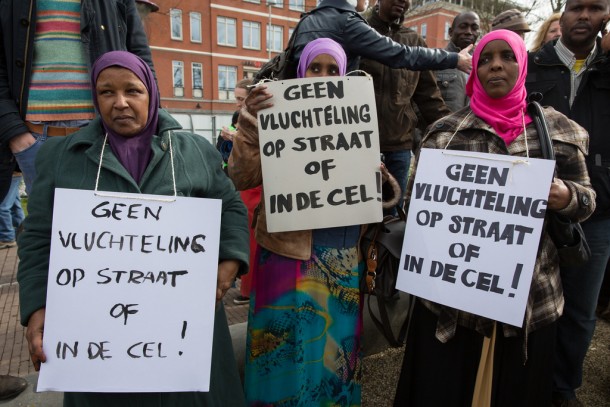Asylum seekers in the Netherlands who are denied residency still have a right to a simple shelter. That was decided by the District Court of Amsterdam on May 8, 2015. The court judged that refusing basic shelter would have such an impact on human dignity that it would impede the right for a private life.
Last month the Dutch government coalition clashed over the issue of providing food and shelter, so called ‘bed, bath, bread’, for asylum seekers whose application is rejected and who despite that are not leaving the country. Reason was a decision of the Council of Europe that said that the Netherlands is obliged to provide shelter to these people. The Committee of Ministers of the Council of Europe stated that emergency aid should ‘be granted also to those who do not, or no longer, fulfil the criteria of entitlement to assistance’. It was also pointed out that this aid ‘cannot be made conditional upon the willingness of the persons concerned to cooperate in the organisation of their own expulsion’. However, it was not specified how this shelter should look like.
According to the Dutch Immigration and Naturalisation Service in 2014, the Netherlands received around 24,000 asylum applications. In the first half of that year around 4000 asylum seekers disappeared from the system and the government does not know where they are. A number of them stay presumably illegally in the country.
The ruling Liberal and Labour parties (VVD and PvdA) hold very different views on the ‘bed, bath, bread’ issue. The Liberals are not in favour of this policy, while the Labour party thinks it is not human to leave asylum seekers whose application was rejected out on the streets. They only reached a compromise with difficulty. The shelter for asylum seekers that exhausted all legal means would be restricted to six cities (Amsterdam, Rotterdam, Den Haag, Utrecht, Eindhoven and Ter Apel) and would be financed by the state. And other municipalities that are already providing ‘bed, bath, bread’ facilities would need to close these.
Municipalities are offering ‘bed, bath, bread’ since December 2014 when the Dutch Administrative High Court ruled it compulsory. It judged that municipalities had to offer a simple shelter till two months after the Committee of the Ministers of the Council of Europe would have given its verdict.
Next month the Dutch Administrative High Court will pass a judgement in a case concerning ‘bed, bath, bread’ and this will clarify whether the compromise of the government will hold.

